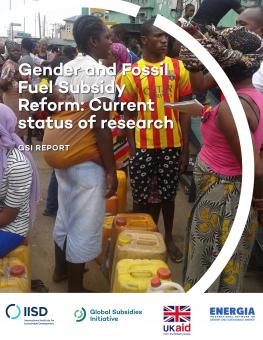
Gender and Fossil Fuel Subsidy Reform: Current status of research
Little is known about the gender differentiated impacts of fossil fuel subsidy reforms. This review takes stock of existing knowledge, identifies knowledge gaps and sets out plans for future research in this area.
This report explores current knowledge on energy subsidy reforms and gender through a review of existing literature.
First, it sets out the global context of energy subsidies, energy access and gender empowerment. It then reviews literature on gender, energy access, fossil fuel subsidies and mitigation measures related to subsidy reform, such as cash transfers. Finally, it provides an overview of these issues across three focus countries: Bangladesh, India and Nigeria, as well as case studies on Peru, Mexico and Morocco.
The review concludes that subsidy reform is a significant opportunity for Sustainable Energy for All and that poorly performing subsidies do not benefit impoverished women. At the national level, however, the removal of subsidies related to lighting and cooking fuels can negatively affect women's lives. As a result, governments should develop more information about the gendered impacts of reforms and, in the meantime, adopt a "precautionary principle," ensuring that reform plans are designed to safeguard women's access to clean household energy sources. The paper also sets out an agenda for future research on this issue in Bangladesh, India and Nigeria.
This is the first publication in the Global Subsidies Initiative project "Gender and Energy Sector Reform," funded by the UK Department for International Development (DfID) and coordinated by the International Network on Energy and Sustainable Energy (ENERGIA). For more information, see www.iisd.org/gsi/fossil-fuel-subsidies/gender.
You might also be interested in
The Cost of Fossil Fuel Reliance
Government support for fossil fuels reached at least USD 1.5 trillion in 2023, new data shows.
Increased Support Needed to Achieve India's Clean Energy Goals
India is on track to achieve many of its 2030 clean energy goals but needs to step up government support measures to accelerate the deployment of offshore wind, electric vehicles, and green hydrogen, according to a new report.
Ending Export Credits for Oil and Gas: How OECD countries can end 2024 with a climate win
For a year now, Organisation of Petroleum Exporting Countries (OECD) governments have been negotiating an agreement that could put an end to oil and gas export finance. Following the acrimony in Baku, this would be a very real way for the OECD to show policy coherence, respond to calls from the poorest countries to stop subsidizing fossil fuels, and shift public finance to solutions.
Fossil Fuel Production, Renewable Energy, and Subsidy Reform in Nationally Determined Contributions 3.0
This policy brief provides an analysis of the critical benchmarks and recommendations necessary for aligning nationally determined contributions (NDCs) with the 1.5 °C target.